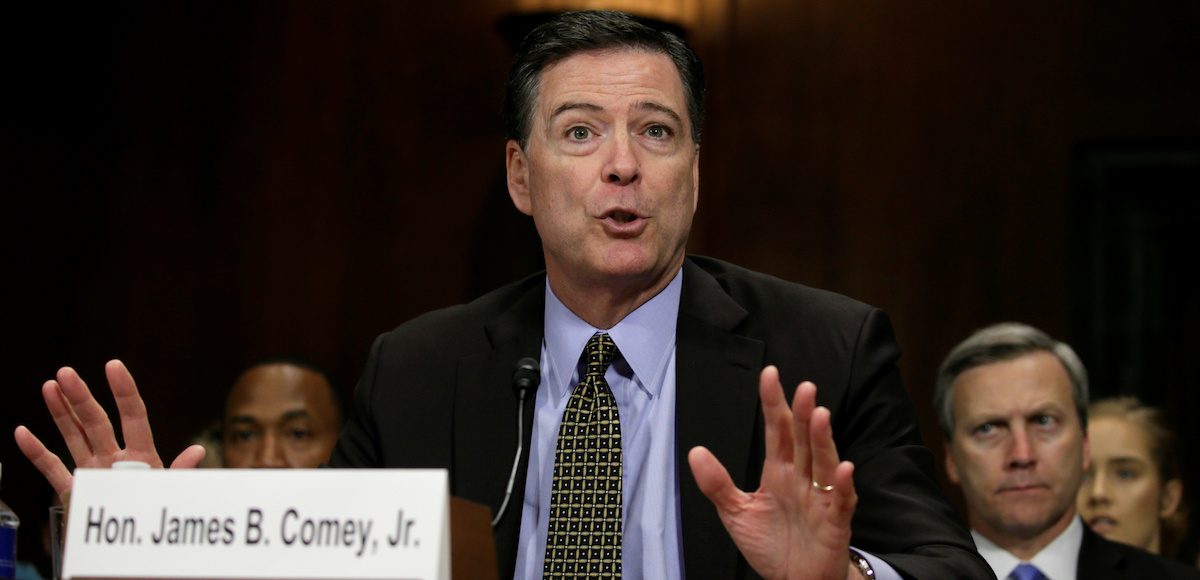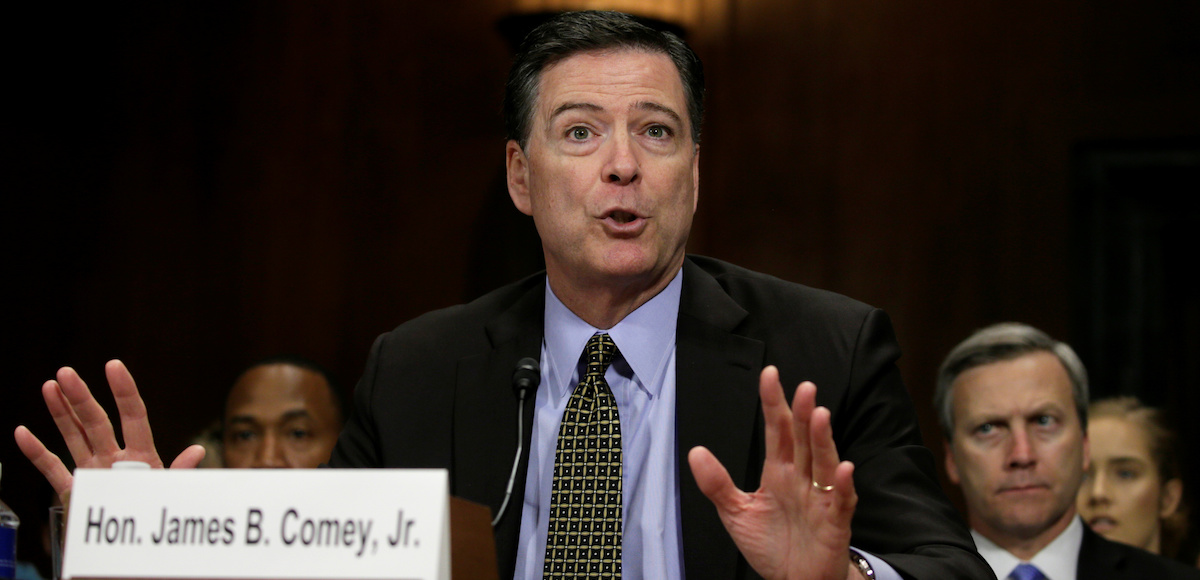

FBI Director James Comey testifies before a Senate Judiciary Committee hearing on “Oversight of the Federal Bureau of Investigation” on Capitol Hill in Washington, U.S., May 3, 2017. (Photo: Reuters)
Legal experts on the right and left say reaction to the alleged Comey memo leaked to The New York Times was overblown and the story was oversold. Further, even if true, the memo raises more questions about the actions of former FBI director James Comey than President Donald J. Trump.
The New York Times story claimed President Trump asked Comey to drop the investigation into former National Security Adviser Michael Flynn. But the Times quoted the memo as saying he “hoped” Lt. Gen. Flynn wasn’t prosecuted because he was a “good man,” to which Comey replied he agreed he was a good man.
The Times and other media outlets widely interpreted the remarks as obstruction of justice, or as the AP put it, President Trump “tried to get Comey to shut down the investigation.”
Legal experts disagree.
In an op-ed in The Hill, liberal law professor Jonathan Turley said the wording still leaves “the need to show that the effort was to influence ‘corruptly’ when Trump could say that he did little but express concern for a longtime associate.” He specifically cited 18 U.S.C. 1503, the criminal code that “demands more than what Comey reportedly describes in his memo.”
For the first time, the Comey memo pushes the litany of controversies surrounding Trump into the scope of the United States criminal code.
However, if this is food for obstruction of justice, it is still an awfully thin soup. Some commentators seem to be alleging criminal conduct in office or calling for impeachment before Trump completed the words of his inaugural oath of office.
But this memo is neither the Pentagon Papers nor the Watergate tapes. Indeed, it raises as many questions for Comey as it does Trump in terms of the alleged underlying conduct.
Professor Turley also pointed out that there’s the fundamental question of what President Trump was even trying to influence. Obstruction cases surround actual judicial proceedings, “not Oval Office” meetings, which did not exist at the time the two men had dinner.
“There is no indication of a grand jury proceeding at the time of the Valentine’s Day meeting between Trump and Comey,” he added.
“Those who don’t know the first thing about the law immediately began hurling words like ‘obstruction of justice’, ‘high crimes and misdemeanors’ and ‘impeachment’,” Gregg Jarrett, a former defense attorney who now works as a Fox News Anchor, wrote a blistering piece entitled “Comey’s revenge is a gun without powder.”
“His gun was cocked, he took aim and fired. But his weapon was empty,” Jarrett wrote in the following piece:
Obstruction requires what’s called “specific intent” to interfere with a criminal case. If Comey concluded, however, that Trump’s language was vague, ambiguous or elliptical, then he has no duty under the law to report it because it does not rise to the level of specific intent. Thus, no crime.
There is no evidence Comey ever alerted officials at the Justice Department, as he is duty-bound to do. Surely if he had, that incriminating information would have made its way to the public either by an indictment or, more likely, an investigation that could hardly be kept confidential in the intervening months.
Comey’s memo is being treated as a “smoking gun” only because the media and Democrats, likely prompted by Comey himself, are now peddling it that way.
After an evening of hysteria following the report, cooler heads have prevailed among lawmakers on Capitol Hill, who are now expressing deep skepticism of the story, Mr. Comey’s actions and the memo, itself.
“We need the facts,” House Speaker Paul Ryan, R-Wis., said during a press conference. “Obviously, there are some people who want to damage the president, but that means before rushing to judgement we need to get all the appropriate information. We are going to want to hear from Jim Comey. If this supposedly happened as he alleges, then why didn’t he notify us?”
Rep. Jason Chaffetz, R-Utah, the Chairman of the House Intelligence Committee, tweeted Tuesday night they are “going to get the Comey memo, if it exists.”
Sen. Richard Burr, R-N.C., the chairman of the Senate Intelligence Committee, as well as Rep. Adam Schiff, D-Calif., the Ranking Member of the House Intelligence Commitee, questioned why Comey didn’t raise the issue during public testimony and private briefings to Congress. Acting FBI director Andrew McCabe was asked point blank during testimony before a Senate subcommittee if the White House had obstructed the counter-intelligence investigation or the probe into Lt. Gen. Flynn.
He testified under oath that they had not.
“Under the law, Comey is required to immediately inform the Department of Justice of any attempt to obstruct justice by any person, even the President of the United States,” Jarret noted. “Failure to do so would result in criminal charges against Comey. (18 USC 4 and 28 USC 1361) He would also, upon sufficient proof, lose his license to practice law.”
President Trump fired Comey after Deputy Attorney General Rod Rosenstein, who was one of the only appointments overwhelmingly confirmed by the fractured U.S. Senate, reviewed his handling of the Clinton email case. He told the President in a letter that he could not defend Comey’s actions.
“But by writing a memo, Comey has put himself in a box. If he now accuses the President of obstruction, he places himself in legal jeopardy for failing to promptly and properly report it,” Jarrett concluded. “If he says it was merely an uncomfortable conversation, he clears the president of wrongdoing and sullies his own image as a guy who attempted to smear the man who fired him.”








DEPLORABLE / May 17, 2017
===>OOOOOOOOH !!! Corrupt, Clown Comey wrote a memo !!!! BFD !!!!!
FYI: I and billions of others write memos ALL THE FRIGGIN’ TIME !!!
Of course, the lunatic-left & RINOS will now claim that if Comey wrote it, it MUST be Gospel truth – that NOBODY can doubt and NOBODY can question !!!!
Seriously, my brain now hurts from all this STUPID !!! (I better get some OBOZOcare to fix it!) https://uploads.disquscdn.com/images/cc1d64a0be47517bbf90f9d91733cddc521096364a6790341c5eea25c1cd6656.jpg
/